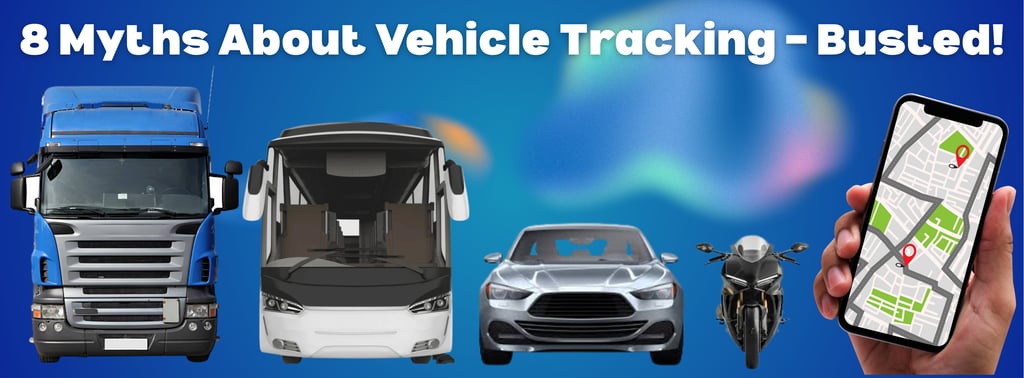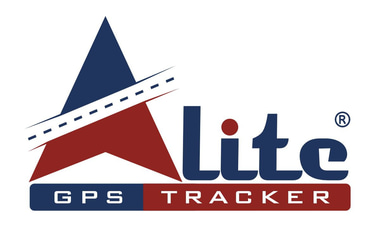Revolutionize Your Tracking Experience – Real Time, Reliable & Effortless tracking solutions
+91 - 7665666631 (Toll Free)
Uncover the truth behind GPS tracking and see how it’s reshaping the way we drive, manage, and secure our vehicles.
Many still believe GPS trackers are complicated, expensive, or only meant for big transport fleets. In this blog, we debunk 8 popular myths about vehicle tracking systems and show how GPS technology offers incredible value, whether you're an individual vehicle owner or a business managing 100+ vehicles.
Chandra Singh
4/29/20254 min read


Introduction
Despite the rising use of GPS tracking devices in both personal and commercial vehicles, many people still carry misconceptions that stop them from enjoying the full benefits of modern vehicle tracking technology. From thinking it’s only for fleets to assuming it drains your car battery, these myths often result in missed opportunities for safety, control, and efficiency.
Let’s bust the most common 8 myths about vehicle tracking systems and show you why it’s one of the smartest upgrades you can make—whether you're a car owner, fleet manager, or parent.
🚫 Myth 1: GPS Trackers Are Only for Commercial Fleets
✅ Truth: GPS tracking has become mainstream—even for private cars, two-wheelers, and personal use.
While transport companies were early adopters, today GPS tracking is used by:
Parents: To monitor new teen drivers’ speed and locations.
Working professionals: For safety when commuting alone.
Families with drivers: To track car usage, over-speeding, and misuse of AC or fuel.
Two-wheeler owners: To locate their bikes in crowded or theft-prone areas.
Car rental/self-drive startups: To prevent vehicle misuse and locate missing cars.
Example: A Jaipur-based doctor installed a GPS tracker in his car to track its movements after repeated concerns about his chauffeur taking unauthorized personal trips.
Today, devices like Alite Basic, Alite AC, and Alite Plus offer advanced vehicle tracking features, making them accessible and practical for both individual users and fleet owners.
🔐 Myth 2: GPS Trackers Are Only Useful After a Vehicle Is Stolen
✅ Truth: The real power lies in prevention and real-time monitoring.
While recovery after theft is valuable, the biggest benefit of GPS tracking is preventing loss or misuse in the first place.
Top features for theft prevention include:
Live Location Tracking: Always know where your vehicle is.
Ignition Alert: Get a notification if someone turns on your car.
Geo-fencing: Set zones like "home" or "school" – get alerts if vehicle exits the zone.
Remote Engine Cut-off: Shut off the engine remotely in case of theft.
Tamper Alerts: Be notified if someone tries to remove or unplug the device.
Example: A fleet owner in Ahmedabad recovered a stolen car within 3 hours using GPS tracking. The thief was unaware the car had an immobilizer relay connected through an Alite device.
So, don't wait for theft—act early to avoid it altogether.
🧰 Myth 3: Installation Is Complicated and Requires a Technician
✅ Truth: Plug-and-play devices and mobile apps have made GPS tracking DIY-friendly.
There are now different types of GPS trackers for every installation preference:
OBD GPS Tracker:
Plug into the car’s OBD port (usually under the dashboard).
No cutting wires or tools needed.
Ideal for quick installation and portability.
Magnet GPS Tracker:
Comes with a strong magnetic base.
Hide under car seat, dashboard, or trunk.
Rechargeable, wireless, discreet.
Wired GPS Tracker:
Wired into the ignition, battery, and optional AC or relay systems.
Offers features like engine cut-off, AC monitoring, SOS button etc.
Best for long-term use and advanced features.
Alite GPS provides easy-to-follow manuals, wiring diagrams, and support, making it easy even for local electricians to install devices in 15–30 minutes.
🛑 Myth 4: GPS Tracking Violates Driver Privacy
✅ Truth: Tracking promotes safety, accountability, and transparency—not spying.
Let’s address the concern honestly: no one likes being monitored unfairly. But in most cases, drivers are informed about GPS tracking, and the objective is protection—not policing.
For personal cars:
Parents track teen drivers to ensure safe routes and speed limits.
Owners with hired drivers track unauthorized use, long engine idling, or AC misuse.
For commercial use:
Drivers are aware they are tracked and benefit from SOS buttons and route planning.
Helps reduce disputes over delays, overtime, and fuel usage.
Privacy laws and good practices recommend:
Informing the driver about GPS usage.
Using data for performance and safety—not personal scrutiny.
Bottom line: GPS builds a sense of mutual accountability and reduces misunderstandings.
🔋 Myth 5: GPS Trackers Drain the Car Battery or Affect Performance
✅ Truth: GPS devices draw minimal power—comparable to a mobile charger.
Worried about your car battery dying because of a GPS tracker? Don’t be.
Modern trackers:
Consume about 5–10 mA in sleep mode.
Have built-in power-saving functions.
Some have an internal backup battery that keeps tracking for hours after the main power is cut.
Alert you immediately if the battery is disconnected or low.
Pro Tip: Range of all Alite GPS Trackers can be configured to enter deep sleep mode during non-use hours or days to save battery even further.
So, you get maximum utility with negligible power draw.
🌐 Myth 6: GPS Trackers Need an Internet Connection to Work
✅ Truth: GPS trackers use data from M2M SIM card and don't need Wi-Fi or user's mobile data.
The GPS device itself uses satellite signals to get the location, and a M2M SIM card (which comes in-built with GPS) to send that data to the cloud server.
What you need:
A mobile app (like Alite Track) to view the live location and reports.
Offline Mode?
If your vehicle enters a no-network zone, the GPS will store data internally and upload it automatically once the signal is back. No data is lost.
Conclusion: No Wi-Fi. No internet from your mobile. Just a simple SIM and you’re good to go.
📊 Myth 7: GPS Trackers Only Show Location—Nothing More
✅ Truth: Today’s GPS systems are full-blown vehicle management tools.
While basic location tracking is still the core, modern devices do so much more:
Trip Reports: View past routes, stops, and speeds.
Driver Behavior Analysis: Speeding, harsh braking, idling, cornering.
Fuel Theft Detection: (When paired with fuel level sensors).
AC Usage Monitoring: Ideal for cabs or chauffeur-driven vehicles.
One-way Audio Monitoring (MIC): Listen to the cabin sound silently.
Panic Button/SOS: Drivers can press it during emergencies.
Immobilizer Relay Control: Remotely turn off the engine.
Use Case: School buses with dual camera 4G dashcams and GPS are now used to ensure child safety with live streaming, internal mic, and SOS button access.
💸 Myth 8: Vehicle Tracking Systems Are Expensive to Maintain
✅ Truth: With prices starting at ₹3,000 and plans under ₹200/month, it’s an affordable investment with high ROI.
Let’s break it down:
Device Cost: Starts from ₹3,000 (Alite Basic) to ₹5,500 (Alite Plus).
Subscription/Platform Cost: ₹150–200/month for full access.
Installation: Sometimes free or under ₹500.
Compare this with what you gain:
Recovery of even one stolen vehicle = thousands saved.
Reduced fuel misuse by drivers.
Better discipline and accountability.
Peace of mind for personal car owners or parents.
✅ Final Thoughts: Myths Busted. Value Proven.
Vehicle tracking has evolved into a powerful, affordable tool that provides:
Real-time visibility
Driver accountability
Operational efficiency
Security and peace of mind
Whether you're a family man worried about your kids’ safety, or a fleet manager wanting to optimize 50+ vehicles—there’s an Alite GPS Tracker that fits your needs.
Empowering Your Journey with Smart Tracking!
Fleet or Personal, We Track It All – Get in Touch
support@alitegps.com
Srag India Info Solutions © 2025. All rights reserved.
Info@alitegps.com
